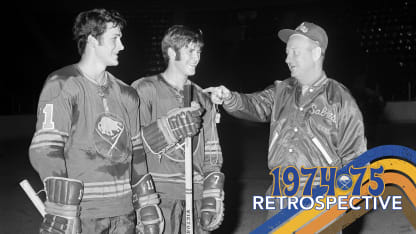All of this is to say: Punch Imlach was a colorful, complicated personality. But, above all, he was a brilliant hockey mind who understood how to build a franchise from the ground up.
The first piece was easy. The Sabres were awarded the first pick in the 1970 amateur draft over fellow expansion team Vancouver thanks to the spin of a roulette wheel, and Imlach made the obvious pick by selecting Gilbert Perreault. With that, the franchise had its centerpiece.
But Perrault alone would not be enough. Imlach would turn the team into a contender with shrewd trades and consistent drafting, but that would take time. In the meantime, he filled the inaugural roster with seasoned veterans who would produce an exciting brand of hockey for the fans in Buffalo.
"He knew he wasn't going any place the first two years with what he had to work with," Robitaille said. "He said, 'Well, we might not win many games, but I'm going to tell you what - if I'm going to bring in some players, I'm going to bring in guys who would blow the lid off this place.'"
The list of acquisitions included goaltender Roger Crozier, a former Calder Trophy and Conn Smythe Trophy winner with Detroit whose career had been slowed by illness and injury. Crozier captured the imaginations of fans with a 50-save performance in the team's inaugural home game, a 3-0 loss to the Montreal Canadiens.
Gerry Meehan - at 24, a key contributor on the 1970-71 team - recalls the presence of veterans like Eddie "The Entertainer" Shack, Phil Goyette, Don Marshall, and Dick Duff as being vital to the development of the team's young players. Imlach coaxed defenseman Tim Horton - a future Hall of Famer who had played under him in Toronto - out of retirement in 1972-73, adding an instant leader and a player who would profoundly impact Buffalo's young defensemen.



















